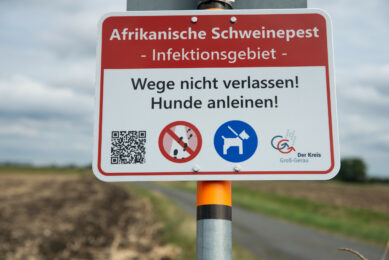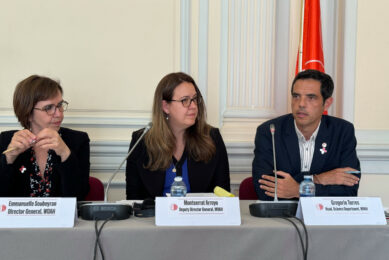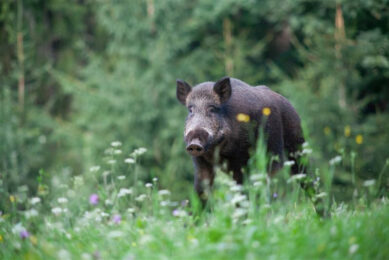Number of ASF cases in EU increases fivefold

The number of outbreaks of African Swine Fever among domestic pigs in the EU last year was 5 times higher than in 2022, reaching a similar magnitude to that in 2019.
This was predominantly driven by the introduction and subsequent spread of ASF in Croatia, where 1,124 cases were reported, and its resurgence in Romania with 736 cases. Those 2 countries together represent 96% of the EU outbreaks. In the rest of the EU, the outbreaks among domestic pigs were sporadic, with 30 in Poland, 16 in Italy and fewer than 10 in the remaining 6 affected Member States. Moreover, almost 7,800 known cases were reported in wild boar, with Poland top of the list with 2,686 cases while Italy reported 1,051 infected wild boar.
ASF in 14 EU member states
This appars from the annual ASF report from the European Food Safety Authority EFSA. In 2023, ASF affected 14 member states, including Croatia and Sweden. ASF re-emerged in Greece after the country had been free from the disease since 2021. Most of the ASF outbreaks among domestic pigs were detected through clinical suspicion (94%), followed by tracing from affected establishments (3%), and the weekly testing of at least 2 dead pigs in establishments (3%). No outbreaks were detected through active surveillance targeting healthy pigs at slaughter, before movement, or randomly selected at establishments.
Seasonal outbreaks
Across the EU, ASF in domestic pigs was notified in 11 regions that had never been affected before, compared with 5 in 2022, located in Croatia, Greece, Germany, Italy and Poland, indicating a wider spread to new areas. Most of the outbreaks (96%) occurred on small establishments with fewer than 100 pigs, and the 6 outbreaks that occurred on establishments with more than 10,000 pigs were all in Romania. Furthermore, ASF outbreaks in domestic pigs were clearly seasonal in all countries, with 88% of outbreaks reported between July and October.
Wild boar
In wild boar, despite the introduction into new countries (Croatia, Greece and Sweden) and the spread in new areas of Italy, only a small increase (10%) in the number of notified outbreaks was observed in the EU in comparison with 2022, with considerable variations between countries. A winter peak was observed only in Poland, Slovakia and Hungary. The epidemiological situation in wild boar improved in Germany and Hungary, as suggested by the decrease in the number of outbreaks and in the proportions of PCR-positive samples from dead wild boar. Overall, 31% of wild boar carcasses found during passive surveillance tested positive by PCR, representing 69% of the ASF outbreaks in wild boar in the EU. In contrast, 0.4% of hunted wild boar tested positive, representing 31% of the outbreaks.
Despite the introduction of ASF into new countries and the increase in the number of outbreaks, the size of restricted zones in the EU remained stable, due to the highly clustered outbreaks in Croatia, and the reduction of restricted zones in Poland, Slovakia and Bulgaria (in domestic pigs), and Hungary (in wild boar).











